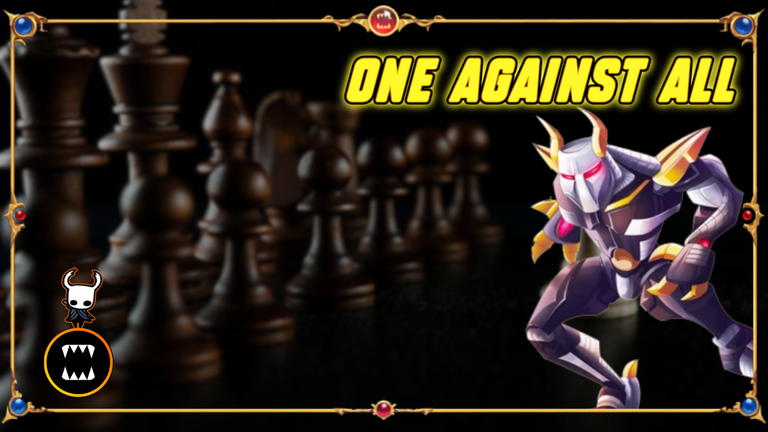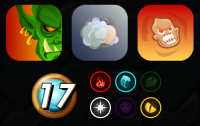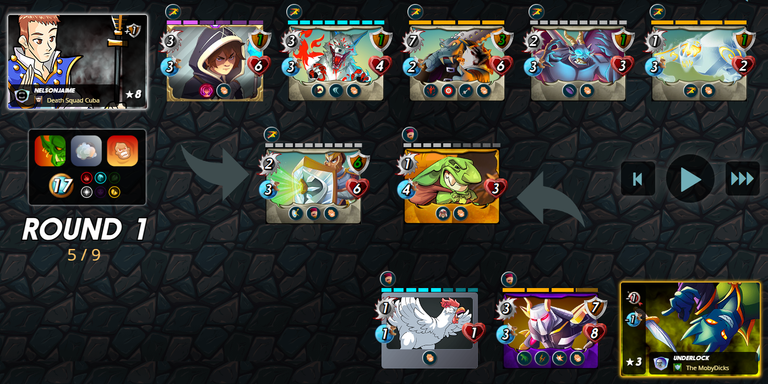
Translated by ChatGPT.
In my last post about Splinterlands, I discussed restrictive Rule Sets and how they strongly influence players' strategic choices. Coincidentally, today I came across another highly restrictive match that was interesting enough to share with you all.

In this match, we had low mana available and were restricted to only Melee Attack  cards due to the Up Close and Personal
cards due to the Up Close and Personal  Rule Set. To make matters worse, the Fog of War
Rule Set. To make matters worse, the Fog of War  Rule Set prevents most cards from attacking from the backline, making compositions with only these cards highly inefficient.
Rule Set prevents most cards from attacking from the backline, making compositions with only these cards highly inefficient.
In such cases, you can opt for two main strategies: focus on a single powerful monster and add support abilities to aid it—choosing summoners like Chanseus the Great or cards with protective abilities such as Flame Monkey—or fully commit to aggression with buffs that enhance the damage of this card. This can work particularly well with a card featuring Bloodlust  if the opponent builds a team with multiple low-cost mana cards.
if the opponent builds a team with multiple low-cost mana cards.
This is the second primary strategy that can be adopted: assembling a team with several low-cost mana cards that can withstand a few hits while dealing consistent damage. For this strategy to succeed, Armor  becomes the key to exponentially increasing your team's survivability. Thus, summoners like Tyrus Paladium or Lorna Shine are the most obvious choices.
becomes the key to exponentially increasing your team's survivability. Thus, summoners like Tyrus Paladium or Lorna Shine are the most obvious choices.
In the battle I'll share today, I focused on a single monster that can tank and deal substantial damage, amplifying its strength with a Martyr  card. Meanwhile, my opponent opted for a composition of six low-cost monsters, except for Jared Scar, which is a solid choice in these situations due to its immense snowball potential.
card. Meanwhile, my opponent opted for a composition of six low-cost monsters, except for Jared Scar, which is a solid choice in these situations due to its immense snowball potential.

The Carnage Titan is an extremely strong option for this matchup because it can potentially deal 6 damage per round (8 after receiving the Martyr buff  ) and takes half the enemy damage thanks to Shield
) and takes half the enemy damage thanks to Shield  . The battle unfolded as expected, though one or two attacks boosted by Enrage
. The battle unfolded as expected, though one or two attacks boosted by Enrage  startled me, making me think the Titan would be defeated. Occasional "Miss" attacks also helped the enemy team, allowing their card to attack before being eliminated.
startled me, making me think the Titan would be defeated. Occasional "Miss" attacks also helped the enemy team, allowing their card to attack before being eliminated.

Fortunately, the Carnage Titan survived the penultimate enemy with just 1 Health, which was enough to secure the victory since Soul Fiend couldn't deal any damage to my card. It was a close battle, but I managed to have my monster take down the entire enemy team!
Thank you so much to everyone who read this far, I hope you enjoyed it. If you like my content, I ask you to send your vote on the post and follow my profile so you can read future posts.




No meu último post de Splinterlands eu abordei sobre as Rule Sets restritivas e como elas influenciam fortemente nas escolhas estratégicas dos jogadores, e coincidentemente hoje eu me deparei com outra partida bastante restritiva que foi interessante o suficiente para ser compartilhada com vocês.

Nessa partida temos pouca mana disponível e estamos restritos a apenas cartas de Dano Corpo a Corpo  por causa da Rule Set Up Close and Personal
por causa da Rule Set Up Close and Personal  , mas para piorar a situação, a Rule Set Fog of War
, mas para piorar a situação, a Rule Set Fog of War  impossibilita que a maioria das cartas sejam capazes de atacar da backline, fazendo com que criar uma composição apenas com essas cartas gere bastante ineficiência.
impossibilita que a maioria das cartas sejam capazes de atacar da backline, fazendo com que criar uma composição apenas com essas cartas gere bastante ineficiência.
Nesses casos você pode optar entre duas principais estratégias: focar em um único monstro poderoso e colocar habilidades de suporte para apoiá-lo, podendo escolher invocadores como Chanseus the Great ou cartas com habilidades de proteção como o Flame Monkey, ou até mesmo partir totalmente para agressão com buffs que potencializam o dano dessa carta. Isso pode funcionar especialmente bem em uma carta com Bloodlust  se o adversário montar uma composição com várias cartas de baixo custo de mana.
se o adversário montar uma composição com várias cartas de baixo custo de mana.
Essa inclusive é a segunda estratégia principal que pode ser adotada, montar um time com várias cartas de baixo custo de mana que são capazes de resistir a alguns golpes e ir causando dano constante. Para que isso funcione, a Armadura  torna-se a peça chave para aumentar exponencialmente a capacidade de sobrevivência do seu time. Por isso invocadores como o Tyrus Paladium ou a Lorna Shrine são as escolhas mais óbvia.
torna-se a peça chave para aumentar exponencialmente a capacidade de sobrevivência do seu time. Por isso invocadores como o Tyrus Paladium ou a Lorna Shrine são as escolhas mais óbvia.
Na batalha que compartilharei hoje, eu foquei em um único monstro que consegue tankar e causar bastante dano, potencializando sua força com uma carta Martyr  . Já o meu adversário preferiu uma composição de 6 monstros de baixo custo, com exceção do Jared Scar que costuma ser uma escolha bastante sólida nessas ocasiões por conta do seu enorme potencial de snowball.
. Já o meu adversário preferiu uma composição de 6 monstros de baixo custo, com exceção do Jared Scar que costuma ser uma escolha bastante sólida nessas ocasiões por conta do seu enorme potencial de snowball.

O Carnage Titan é uma opção extremamente forte para esse confronto pois ele consegue causar potencialmente 6 de dano por rodada (8 após receber o buff de Martyr  ) e recebe metade do dano inimigo por causa do Shield
) e recebe metade do dano inimigo por causa do Shield  . A batalha aconteceu conforme o esperado, apesar de que um ou dois ataques potencializados pelo Enrage
. A batalha aconteceu conforme o esperado, apesar de que um ou dois ataques potencializados pelo Enrage  me assustaram e eu acreditei que o Titan seria derrotado. Eventuais "Miss" acabaram ajudando o time inimigo, permitindo que sua carta conseguisse atacar antes de ser abatida.
me assustaram e eu acreditei que o Titan seria derrotado. Eventuais "Miss" acabaram ajudando o time inimigo, permitindo que sua carta conseguisse atacar antes de ser abatida.

Para a minha sorte o Carnage conseguiu resistir ao penultimo adversário com apenas 1 de Vida, mas isso já foi suficiente para garantir a vitória já que o Soul Fiend seria incapaz de causar algum dano na minha carta. Essa foi uma batalha apertada mas eu consegui fazer com que meu monstro derrubasse todo o time inimigo!
Muito obrigado a todos que leram até aqui, espero que tenham gostado. Se vocês curtirem meus conteúdos, peço que deixem o seu voto na postagem e sigam o meu perfil para poderem acompanhar as futuras postagens.


Posted Using InLeo Alpha


